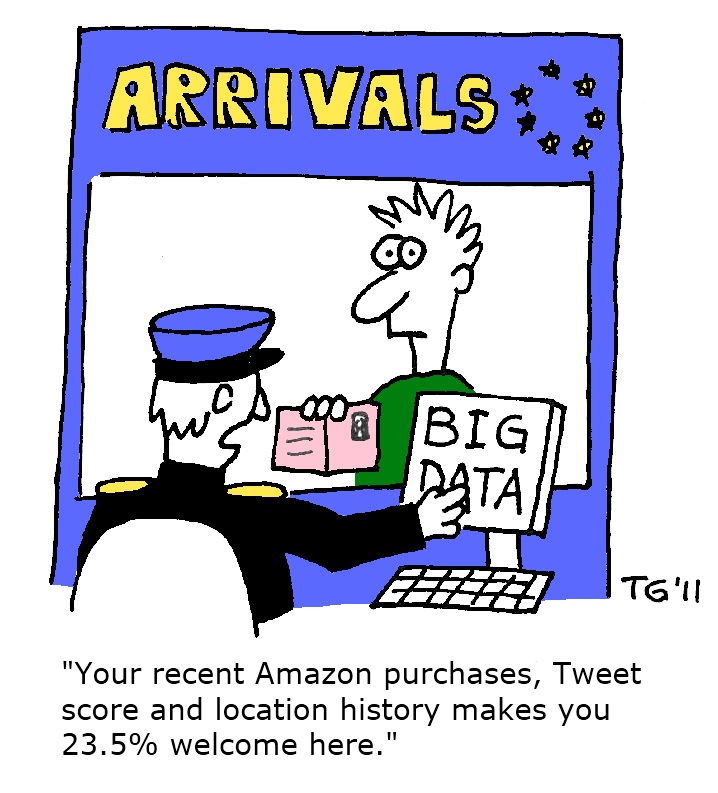My Big Data headache
One of the classes I teach involves helping students understand the concept of Big Data. And it gives me a headache to think about it.
Big Data describes all the digital transaction information organizations acquire about us. Our health records (supposedly safe) are part of Big Data. When I buy kosher hot dogs, orange seltzer, and Tums (don't ask) at Wegmans, the loyalty card I carry tags my purchase in some data file. That becomes part of Big Data.
Taken together, an immense database contains our online purchase histories, our health histories, our online tussles with Microsoft, and so on. Most companies struggle to sift and manage this trove. And few can explain how hackers get into their computer servers and swipe it.
In 2013, Target experienced a major data breach. They were hacked. The chief information officer resigned. A few months later, after Target experienced an awful fourth quarter, the CEO quit, too.
Earlier this year, the second-larger U.S. health insurer, Anthem, got hacked. Seventy-eight million customers' personal data, by some estimates, was placed at risk. Joe Swedish, Anthem's CEO, is still in place, at last report.
You'd think these high-profile examples of mismanaging Big Data would have cued other organizations to check and reinforce their data safeguards. Sadly, Excellus Blue Cross Blue Shield in Rochester, NY didn't lock the gates in time. Ten million personal records -- including mine -- may have been stolen in their August 2015 hacking.
What do we get, as customers? Precious little. Two years of free credit monitoring. And assurances that don't reassure us.
There's no public relations aspirin to cure this headache. I couldn't even suggest one. Maybe a video public apology from CEOs like Anthem's Swedish or Excellus' Christopher Booth. They would be more credible than press-release promises such as ""Protecting personal information is one of our top priorities and we take this issue seriously."
Not seriously enough, I'm afraid.
Because for all the talk about Big Data, there's no public face. No leader at the corporate or government level who's truly accountable for protecting the public's private information. And in this day and age, shouldn't there be an officer at Department of Homeland Security whose job is safeguarding the public from corporate hacking failures?
As for my students, I have mixed feelings about extolling the marketing potential of unlocking Big Data. Because, so far, the people actually unlocking Big Data have been thieves and scoundrels.
Big Data describes all the digital transaction information organizations acquire about us. Our health records (supposedly safe) are part of Big Data. When I buy kosher hot dogs, orange seltzer, and Tums (don't ask) at Wegmans, the loyalty card I carry tags my purchase in some data file. That becomes part of Big Data.
 |
| By Thierry Gregorius (Cartoon: Big Data) , via Wikimedia Commons |
In 2013, Target experienced a major data breach. They were hacked. The chief information officer resigned. A few months later, after Target experienced an awful fourth quarter, the CEO quit, too.
Earlier this year, the second-larger U.S. health insurer, Anthem, got hacked. Seventy-eight million customers' personal data, by some estimates, was placed at risk. Joe Swedish, Anthem's CEO, is still in place, at last report.
You'd think these high-profile examples of mismanaging Big Data would have cued other organizations to check and reinforce their data safeguards. Sadly, Excellus Blue Cross Blue Shield in Rochester, NY didn't lock the gates in time. Ten million personal records -- including mine -- may have been stolen in their August 2015 hacking.
What do we get, as customers? Precious little. Two years of free credit monitoring. And assurances that don't reassure us.
There's no public relations aspirin to cure this headache. I couldn't even suggest one. Maybe a video public apology from CEOs like Anthem's Swedish or Excellus' Christopher Booth. They would be more credible than press-release promises such as ""Protecting personal information is one of our top priorities and we take this issue seriously."
Not seriously enough, I'm afraid.
Because for all the talk about Big Data, there's no public face. No leader at the corporate or government level who's truly accountable for protecting the public's private information. And in this day and age, shouldn't there be an officer at Department of Homeland Security whose job is safeguarding the public from corporate hacking failures?
As for my students, I have mixed feelings about extolling the marketing potential of unlocking Big Data. Because, so far, the people actually unlocking Big Data have been thieves and scoundrels.